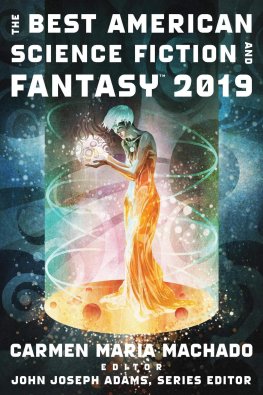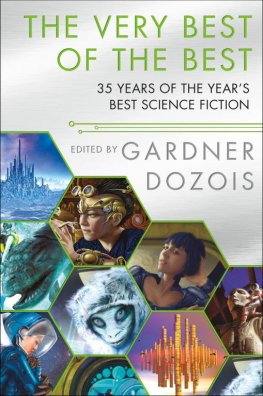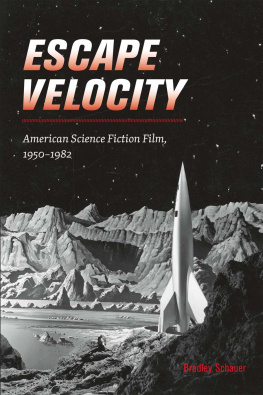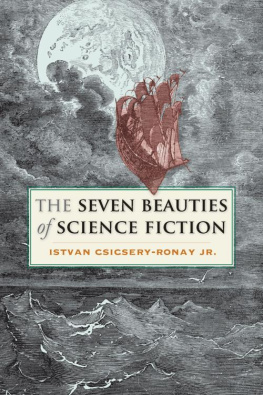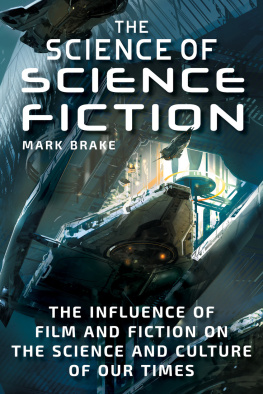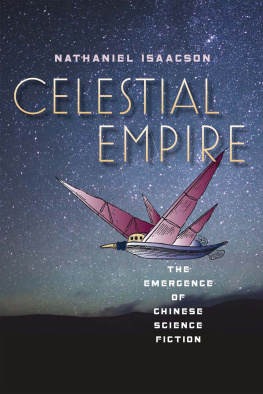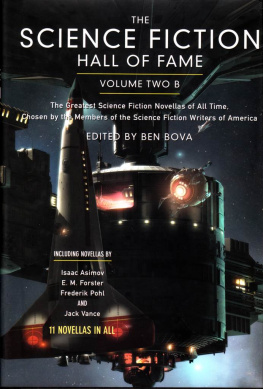THE EMERGENCE
OF LATIN AMERICAN
SCIENCE FICTION
THE EMERGENCE
OF LATIN AMERICAN
SCIENCE FICTION
THE EMERGENCE OF
LATIN
AMERICAN
SCIENCE
FICTION
RACHEL HAYWOOD FERREIRA

WESLEYAN UNIVERSITY PRESS
Middletown CT 06459
www.wesleyan.edu/wespress
2011 Rachel Haywood Ferreira
All rights reserved
Manufactured in the United States of America
Wesleyan University Press is a member of
the Green Press Initiative. The paper used in
this book meets their minimum requirement
for recycled paper.
Library of Congress Cataloging-in-Publication Data
Haywood Ferreira, Rachel
The emergence of Latin Amercian science fiction /
Rachel Haywood Ferreira.
p. cm.(Early classics of science fiction)
Includes bibliographical references and index.
ISBN 978-0-8195-7081-9 (cloth : alk. paper)
ISBN 978-0-8195-7082-6 (pbk. : alk paper)
1. Science fiction, Latin AmericanHistory and
criticism. 2. Science fiction, BrazilianHistory
and criticism. 4. Science fiction, MexicanHistory
and criticism. I. Title.
PQ7082.S34H39 2011
863'.087620998dc22 2010034595
5 4 3 2 1
CONTENTS
Fsforos-Cerillos, Mexico in the Year 1970 / Joaquim Felcio dos Santos, Pages from the History of Brazil Written in the Year 2000 / Eduardo Ladislao Holmberg, The Marvelous Journey of Mr. Nic-Nac... / Eduardo de Ezcurra, In the Thirtieth Century / Godofredo Barnsley, So Paulo in the Year 2000... / Eduardo Urzaiz, Eugenia
Augusto Emlio Zaluar, Doctor Benignus / Eduardo Ladislao Holmberg, Two Factions Struggle for Life / Leopoldo Lugones, Essay on a Cosmogony in Ten Lessons, The Origin of the Flood, Yzur / Joaquim Manuel de Macedo, The End of the World / Alusio Azevedo, Demons / Amado Nervo, The Last War / Martn Luis Guzmn, How the War Ended in 1917
Eduardo Ladislao Holmberg, Two Factions Struggle for Life [coda] / Carlos Olivera, Death at a Fixed Hour / Leopoldo Lugones, The Omega Force, Psychon, An Inexplicable Phenomenon, Viola Acherontia, Metamusic / Miguel Can, The Harmonies of Light / Juana Manuela Gorriti, He Who Listens May HearTo His Regret: Confidence of a Confidence / Pedro Castera, A Celestial Journey, Querens / Amado Nervo, The Soul-Giver, The Sixth Sense
Eduardo Ladislao Holmberg, Horacio Kalibang or The Automatons / Alejandro Cuevas, The Apparatus of Doctor Tolimn / Horacio Quiroga, The Artificial Man, The Portrait, The Vampire
ILLUSTRATIONS
ACKNOWLEDGMENTS
This book has been over ten years in the making, and writing it would have been impossible without an especially broad network of people. I owe many debts of gratitude for the materials, information, enthusiasm, and intellectual and moral support of more people and institutions than can be listed here.
I would like to thank Iowa State University and Yale University for supporting this project from the research through the publication stage. An Iowa State University Publication Subvention Grant has been immensely helpful, along with an ISU Center for Excellence in the Arts and Humanities Fellowship for Scholarship and Creativity and five College of Liberal Arts and Sciences Small Grants. Support from Yale included a Cleanth Brooks Fellowship in the Humanities, a John Perry Miller Award, a C. Malcolm Batchelor Award in Memory of Adalenie Morales, and a Hewlett Award.
I owe special debts to the following librarians and libraries: Csar Rodrguez, Curator of the Latin American Collection, and Jeffry Larson, Librarian for Romance Languages and Literatures, Linguistics, and Classics at Sterling Memorial Library, Yale University; Marta Palchevich and Luis Pestarini at the Biblioteca del Congreso, Buenos Aires, Argentina; the Academia Argentina de Letras; the Biblioteca Nacional do Brasil, in particular the Diviso de Informao Documental, directed by Eliane Perez, as well as the Seco de Peridicos and the division of Obras Raras; Regina Porto and the Casa de Rui Barbosa in Rio de Janeiro, Brazil. In the Interlibrary Loan unit of Parks Library at Iowa State, the efforts of Dr. Wayne Pedersen and his staff in obtaining rare primary source materials have been nothing short of heroic.
A number of texts consulted in writing this book are available only in private collections. Much information about Latin American science fiction is archived only in the memories of individuals. In all my research in Latin America and the United States, no one has ever refused an interview (or two, or three), and I am overwhelmed by peoples generosity with their time and their materials. Particular thanks are due to Eduardo Carletti, Braulio Tavares, and Roberto de Sousa Causo, without whom the remainder of this list would be much shorter.
In Argentina, special thanks to Eduardo Carletti and the members of the Taller de ciencia ficcin argentina. Many thanks as well to Pablo Capanna, Gastn Gallo of Simurg, Elvio Gandolfo, Guillermo Garca, Carlos Gardini, Sergio Gaut vel Hartman, Jos Antonio Lpez Cancelo, Marcelo Montserrat, Horacio Moreno, and Francisco Solano Lpez. In Brazil, additional thanks to Gerson Lodi-Ribeiro, Gumercindo Rocha Drea, R. C. Nascimento, Marcelo Simo Branco, Ataide Tartari, Humberto Fimiani, and Alfredo Keppler. In Mexico, Mauricio-Jos Schwarz provided key contacts and Miguel ngel Fernndez-Delgado was instrumental in identifying and locating texts. In Latin America and the United States, I am grateful to the community of scholars of international science fiction for their pioneering work in the field and for their support of my own scholarship; their names can be found throughout the text and bibliography of this book. Special thanks to Andrea Bell, Pablo Brescia, Luis C. Cano, M. Elizabeth Ginway, Dale Knickerbocker, and Yolanda Molina-Gaviln.
I would like to express my appreciation to the faculty of the Department of Spanish and Portuguese at Yale University. In particular, Professor Josefina Ludmer was and continues to be all that one could wish for in a mentor. Her advice, the clarity of her critical vision, and her friendship and encouragement I will value always. The support of my colleagues at Iowa State University has also been invaluable. Especial thanks for discussions both theoretical and practical go to Kevin Amidon, John Warne Monroe, Mark Rectanus, and Madeleine Henry. Thank you to Dawn Bratsch-Prince for encouragement, advice, and most importantly for her time.
Thanks to the external reviewers of my articles and book manuscript for their valuable input. Thanks also to Arthur Evans, Suzanna Tamminen, Parker Smathers, and everyone at Wesleyan University Press for their professional expertise and for their unstinting support of this project throughout the writing, revision, and publication process. I am especially grateful to Art Evans for working with me on this manuscript; his insight and his kindness have been truly inestimable. My thanks as well to all at the University Press of New England who shepherded this manuscript through the copyediting and production process.
Finally, I thank my mother for copyediting every early draft of my work. The grace of her punctuation and the accuracy of her whiches and thats are beyond compare, but I am most grateful for her company on the lonelier parts of the road. My parents Carl and Janis Haywood, my sister Kal Haywood, my mother-in-law Maria Elisabete Roberto, my sister-in-law Tnia Ferreira, my husband Nuno Ferreira Haywood, and our son Lucas continue to teach me the meaning of family. This book is for them.
Next page

